Zhao He
Quantum-activated neural reservoirs on-chip open up large hardware security models for resilient authentication
Mar 21, 2024



Abstract:Quantum artificial intelligence is a frontier of artificial intelligence research, pioneering quantum AI-powered circuits to address problems beyond the reach of deep learning with classical architectures. This work implements a large-scale quantum-activated recurrent neural network possessing more than 3 trillion hardware nodes/cm$^2$, originating from repeatable atomic-scale nucleation dynamics in an amorphous material integrated on-chip, controlled with 0.07 nW electric power per readout channel. Compared to the best-performing reservoirs currently reported, this implementation increases the scale of the network by two orders of magnitude and reduces the power consumption by six, reaching power efficiencies in the range of the human brain, dissipating 0.2 nW/neuron. When interrogated by a classical input, the chip implements a large-scale hardware security model, enabling dictionary-free authentication secure against statistical inference attacks, including AI's present and future development, even for an adversary with a copy of all the classical components available. Experimental tests report 99.6% reliability, 100% user authentication accuracy, and an ideal 50% key uniqueness. Due to its quantum nature, the chip supports a bit density per feature size area three times higher than the best technology available, with the capacity to store more than $2^{1104}$ keys in a footprint of 1 cm$^2$. Such a quantum-powered platform could help counteract the emerging form of warfare led by the cybercrime industry in breaching authentication to target small to large-scale facilities, from private users to intelligent energy grids.
Ranking Regularization for Critical Rare Classes: Minimizing False Positives at a High True Positive Rate
Mar 31, 2023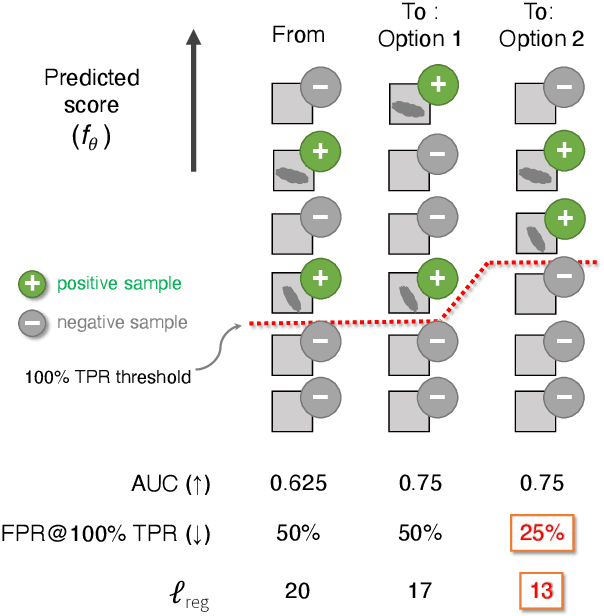


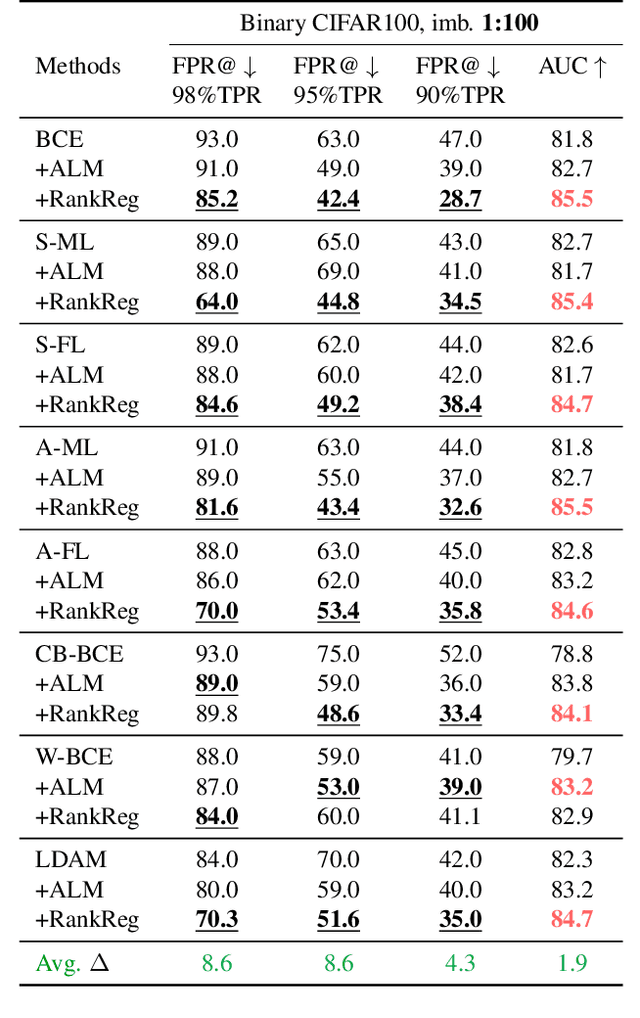
Abstract:In many real-world settings, the critical class is rare and a missed detection carries a disproportionately high cost. For example, tumors are rare and a false negative diagnosis could have severe consequences on treatment outcomes; fraudulent banking transactions are rare and an undetected occurrence could result in significant losses or legal penalties. In such contexts, systems are often operated at a high true positive rate, which may require tolerating high false positives. In this paper, we present a novel approach to address the challenge of minimizing false positives for systems that need to operate at a high true positive rate. We propose a ranking-based regularization (RankReg) approach that is easy to implement, and show empirically that it not only effectively reduces false positives, but also complements conventional imbalanced learning losses. With this novel technique in hand, we conduct a series of experiments on three broadly explored datasets (CIFAR-10&100 and Melanoma) and show that our approach lifts the previous state-of-the-art performance by notable margins.
A Long Short-term Memory Based Recurrent Neural Network for Interventional MRI Reconstruction
Apr 12, 2022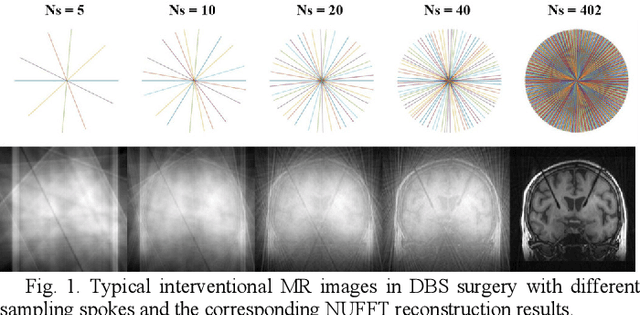
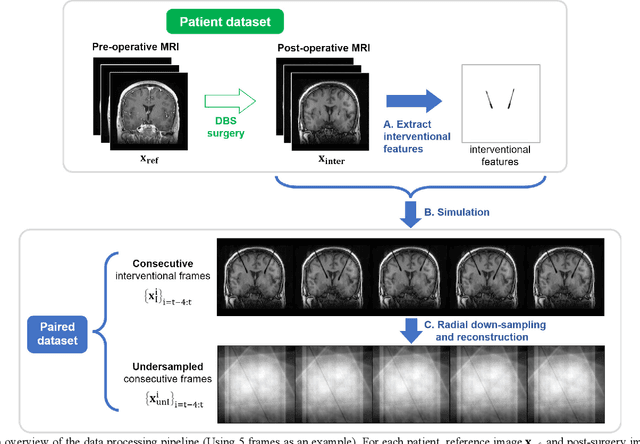
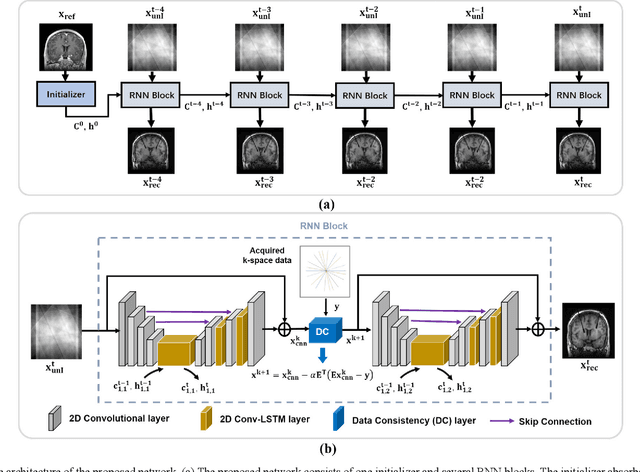
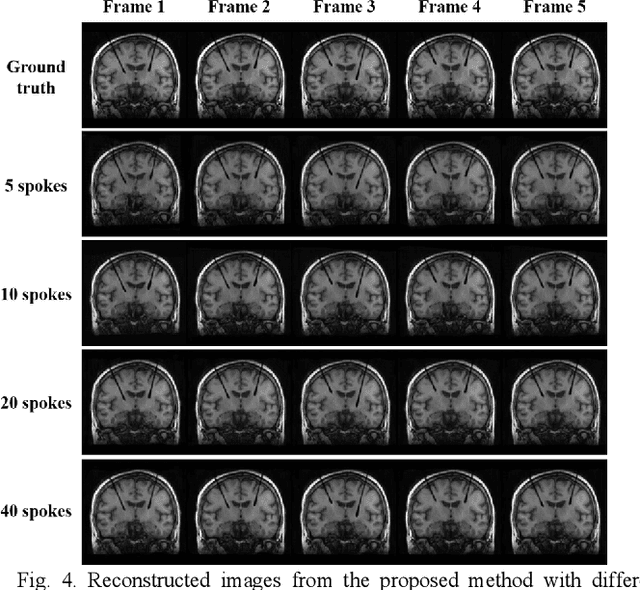
Abstract:Interventional magnetic resonance imaging (i-MRI) for surgical guidance could help visualize the interventional process such as deep brain stimulation (DBS), improving the surgery performance and patient outcome. Different from retrospective reconstruction in conventional dynamic imaging, i-MRI for DBS has to acquire and reconstruct the interventional images sequentially online. Here we proposed a convolutional long short-term memory (Conv-LSTM) based recurrent neural network (RNN), or ConvLR, to reconstruct interventional images with golden-angle radial sampling. By using an initializer and Conv-LSTM blocks, the priors from the pre-operative reference image and intra-operative frames were exploited for reconstructing the current frame. Data consistency for radial sampling was implemented by a soft-projection method. To improve the reconstruction accuracy, an adversarial learning strategy was adopted. A set of interventional images based on the pre-operative and post-operative MR images were simulated for algorithm validation. Results showed with only 10 radial spokes, ConvLR provided the best performance compared with state-of-the-art methods, giving an acceleration up to 40 folds. The proposed algorithm has the potential to achieve real-time i-MRI for DBS and can be used for general purpose MR-guided intervention.
 Add to Chrome
Add to Chrome Add to Firefox
Add to Firefox Add to Edge
Add to Edge